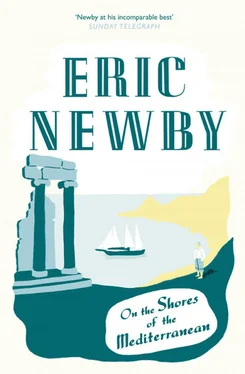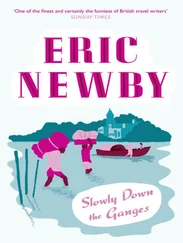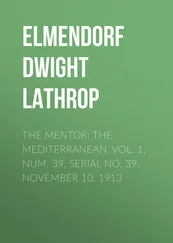We always start at the most distant vineyard, which may be a mile or more away from the house, up or down the hillside, often separated from it by other people’s properties and usually only reached by the roughest and steepest of tracks.
In some of the vineyards the grapes are still trained on pergole , trellises, some of them extended out over steep banks which are anything up to eight feet high. Pergole are picturesque and shade you from the midday sun, but they no longer accord with modern wine-making theory. No more trellises are being constructed, and new vineyards are planted in regular, widely-spaced parallel rows in fields bulldozed out of the hillside, and the pretty terraced fields one above the other will soon be no more. It is difficult to cut the bunches of grapes under a pergola . If they are very high you have to use triangular, home-made step ladders, which everyone keeps for this purpose and for harvesting the olives later in the year, but often, when the ground underneath is too bumpy to set them up, I find myself swinging from the pergola , like one of the larger primates trying to reach some far-out bunches.
If it rains it is hell. If it rains heavily you have to stop work, because you get too much water with the grapes when you squash them in the press. A sack is the best thing to wear over the head and shoulders when it rains, cooler and less constricting than a waterproof. If the grapes are more or less a write-off, as they were in 1972, and it rains as well, it is indeed lugubrious, but whatever the conditions, the day passes in constant gossip, which seems to become more and more lubricious as the day goes on; some of the more hair-raising stories being recounted by respectable-looking ladies dressed in the deepest black. From time to time, gusts of laughter sweep through the vineyard as a result of some particularly coarse remark. Some of the time I don’t harvest the grapes. Instead I am given the job of heaving the bigonci , filled with grapes, on to the trailer which will take them back to the press. This is because I am one of the few grown men here who haven’t yet had a hernia from lifting enormous weights.
At about ten o’clock, after we have worked for a couple of hours or more, we have a merenda , a picnic, in whichever field we happen to be in, brought there by the farmer’s wife; a very un-English breakfast spread out on a white cloth on the grass, with lots of fresh pecorino, cheese made with ewe’s milk, prosciutto, and what is here called mortadella but which is nothing like real mortadella di Bologna – more like salami – bread baked in the outside wood oven which every house possesses, and wine. We go on having swigs of wine throughout the day, to keep us going, not much but enough, always white.
At about a quarter to one we go back to the house for the midday meal, by which time we have, temporarily at least, had enough. All the morning a band of women have been sorting the bunches that they take from the baskets at tables set up in the various fields, cutting off long stalks, removing leaves which would give the wine a bad taste and rejecting unripe grapes or those covered with mildew, before putting the rest into the bigonci . Sometimes, if it is hot, we eat at a long table outside in the yard, but usually we are in the parlour with great black and white photographs of ancestors on the walls. We never drink before the meal, apart from the occasional swig we have already had in the fields, and we never mix white with red, because drinking on an empty stomach and mixing white with red is thought to be injurious to health.
We eat brodo , broth, made with beef or chicken stock, with pasta in it, followed by manzo bollito , boiled beef, stuffed with a mixture of spinach, egg, parmigiano cheese and mortadella; and also roast or boiled chicken chopped up with a chopper and the bones broken, the chickens being the best sort that have scratched a living in the yard, roast potatoes, the bitter green salad called radici , mixed with home-produced olive oil and vinegar, and plates of delicious tomatoes eaten with oil, salt and pepper.
The afternoon seems longer and harder and, if it is hot, much hotter than the morning, and the work goes on in the fields until it is so dark that it is no longer possible to see anything. It goes on longer back at the house where there is usually a last trailer-load of bigonci full of grapes that have to be fed into the macchina da macinare , from which they fall into full ones which you hoist on your shoulder before staggering away with them and pouring the contents into one of the barili in which it will eventually become wine.
Now, after a good wash at a tap in the yard, we all sit down again, with the children home from school, to eat a dinner: a home-made ravioli (each house has a special piece of furniture called a madia , a sort of dough tray, for making pasta), more meat and chicken, but never for some reason pork, then cheese and lots of walnuts, with which we drink the stronger, sweeter wines of which the owner is usually very proud, and coffee.
Then we all reel home under the stars, or through wetting rain, sometimes, if we have indulged too freely, falling into ditches which some thoughtless fellows seem to have dug since we passed that way in the morning; and the next day will be the same, and the next.
This time, we had not come here only to make the wine or simply to drink it while at the same time enjoying the heat of the Mediterranean sun. This time, we were using I Castagni as the point of departure for other, some of them wilder, shores of the Mediterranean. Now it was August. This year, to do our vendemmia we would have to return from wherever we happened to be.
What we were hoping to do was to travel around the shores of the Mediterranean, or as many as we felt inclined to travel round (some of them being at that time – as they still are – either difficult or undesirable places to visit unless you have to), with the idea of seeing people, places and things that we had either never seen before or had not seen for so long that we both wanted to see them again and to discover – though we were less anxious about this – what changes time had wrought in them.
‘Shores’ were something we were going to interpret liberally. I knew, from visiting our own neighbouring shores in the Gulf of Spezia and almost the entire Tuscan littoral south of it as far as Livorno, that if I slavishly traversed the entire coastline of the Mediterranean I would end up either as a topographical bore or as one of those prophets of doom and pollution who is actually confronted with what he has been prophesying, rather as Smollett was when he travelled to Rome by way of the Riviera in the eighteenth century. For what has happened to enormous tracts of the Mediterranean was, as we later found out if we did not know it already, too awful for anyone but the most insensitive traveller to contemplate. All the coasts of the Mediterranean, from the east coast of Spain in the latitude of the Balearic Islands to Albania, including the coasts of France, Italy and Yugoslavia, Corsica, Sardinia, Sicily and the Balearics, are so badly polluted that swimming and eating fish caught in these waters is said to be dangerous, and the same applies in the eastern Mediterranean from northern Syria to the borders of Egypt and Libya.
‘Shores’ were something we interpreted to include places that might be far inland – such as Fez in Morocco where I had long wanted to go, or the edge of the Sahara – providing that they were part of the Mediterranean world. History was something I proposed not to delve into too deeply, even though in order to pay for this land-borne Odyssey I was going to write a book about it. The thought of attempting to chronicle in more or less detail the peoples who had dwelt on its shores, sometimes merely as a passing whim, made my mind reel: Minoans, Egyptians, Greeks, Macedonians, Israelites, Phoenicians, Romans, Dacians, Etruscans, Carthaginians, Persians, Arabs, Assyrians, Albanians, Jews, Vikings, Crusaders of various nationalities, Byzantines, Vandals, Genoese, Turks, Venetians, Dutch, English, French, Spaniards, Slovenes and Croats and Montenegrins, Barbary pirates of various sorts and goodness knows who else, like a cast of billions in some colossal, crazy Cecil B. de Mille film of the thirties. It was no wonder that many of the writers of books about the Mediterranean, of whom there are lots, had failed to keep such a mob under control. I had no intention of trying.
Читать дальше












